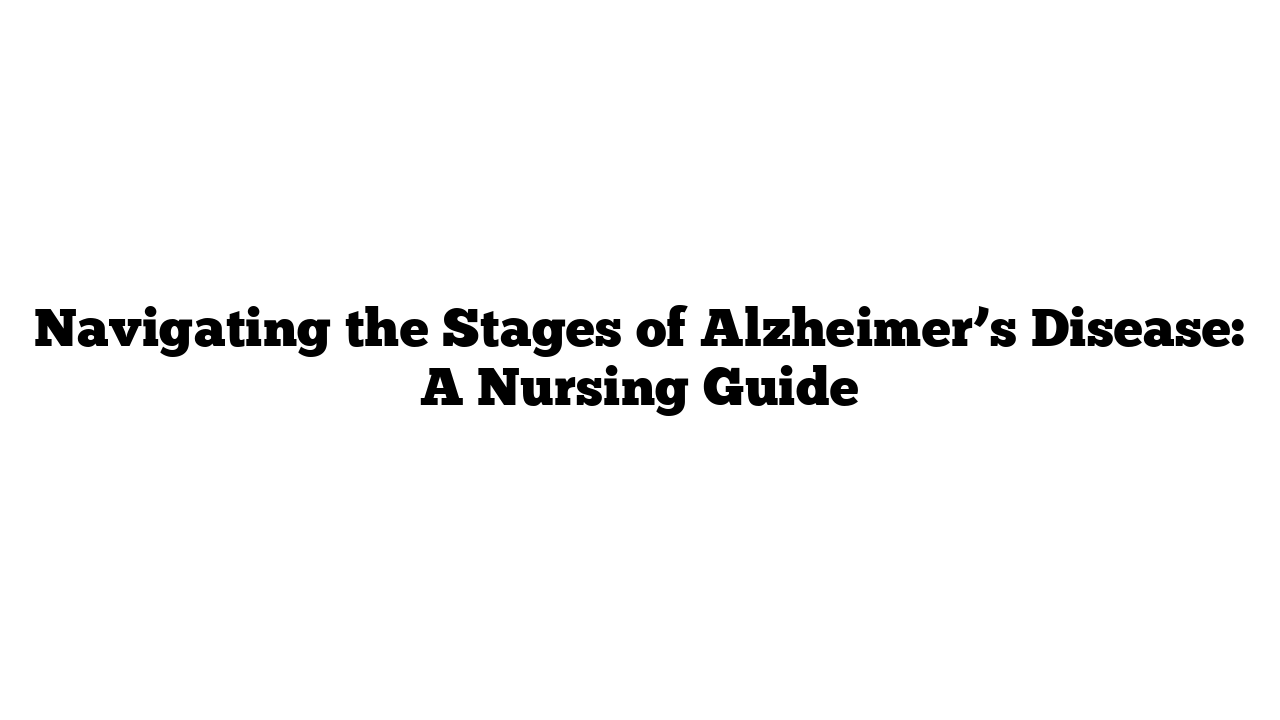Alzheimer’s disease is a progressive neurological disorder that affects memory, thinking, and behavior. Understanding its stages can help caregivers, families, and medical professionals provide better care and plan for the future. In this article, we’ll explore the stages of Alzheimer’s disease, from the earliest signs to advanced care, with insights tailored for caregivers and nursing professionals.
What Are the Stages of Alzheimer’s Disease?
Alzheimer’s disease progresses through several stages, each with unique challenges and needs. These stages are generally categorized into five phases:
- Preclinical Alzheimer’s Disease
- Mild Cognitive Impairment (MCI)
- Mild Alzheimer’s Disease
- Moderate Alzheimer’s Disease
- Severe Alzheimer’s Disease
Let’s examine each stage in detail.
1. Preclinical Alzheimer’s Disease
This stage is silent and occurs long before symptoms appear. Changes in the brain, such as amyloid plaque buildup, are happening, but there are no outward signs of the disease.
- Duration: This phase can last for years or even decades.
- Symptoms: None are noticeable at this stage.
Early detection through advanced imaging and biomarkers is an area of ongoing research. While interventions at this stage are limited, lifestyle changes, such as a healthy diet and regular exercise, may promote brain health.
2. Mild Cognitive Impairment (MCI)
This stage is often the first sign that something is amiss. Individuals experience mild memory lapses that don’t significantly impact daily life but may raise concerns.
- Symptoms:
- Forgetting recent events or conversations.
- Struggling with time and place orientation.
- Feeling “foggy” or unable to think clearly.
- Impact:
Individuals remain independent, but they may notice subtle changes. Friends and family might also start observing small lapses.
This stage often lasts for several years and is an opportunity to discuss concerns with a healthcare provider.
3. Mild Alzheimer’s Disease (Early Stage)
This is often when a formal diagnosis is made. Symptoms become more noticeable and begin to interfere with some daily activities.
- Symptoms:
- Frequent misplacement of objects.
- Difficulty learning new information.
- Repetition in conversations.
- Mood changes, such as depression or anxiety.
- Key Considerations for Caregivers:
- Independence: Patients are still able to manage most of their daily tasks.
- Planning for the Future: This is the time to discuss estate planning, end-of-life care, and long-term caregiving strategies.
This stage typically lasts a couple of years, and maintaining a structured routine can help ease stress for the individual and their caregivers.
4. Moderate Alzheimer’s Disease (Middle Stage)
This stage marks significant cognitive decline and loss of independence.
- Symptoms:
- Increased confusion and disorientation.
- Trouble with personal hygiene and dressing appropriately.
- Episodes of anger, anxiety, or hallucinations.
- Wandering and safety risks.
- Sun-Downing Syndrome:
Many individuals experience worsening symptoms in the late afternoon or evening, becoming restless, agitated, or confused. - Care Needs:
- 24/7 supervision becomes necessary.
- Assistance with bathing, dressing, and meal preparation is required.
This stage is the longest and often the most challenging for caregivers. Building a support system, whether through family, professional caregivers, or local resources, is critical.
5. Severe Alzheimer’s Disease (Late Stage)
In this final stage, the disease takes a severe toll on both mental and physical functioning.
- Symptoms:
- Minimal communication.
- Inability to perform daily tasks.
- Loss of motor abilities.
- Difficulty swallowing (dysphagia), increasing the risk of pneumonia.
- Care Focus:
- Comfort and quality of life become the primary goals.
- Non-verbal communication, such as touch or facial expressions, is key.
- A calm and relaxing environment, with soothing music or familiar objects, can help reduce anxiety.
Patients at this stage require constant care, often involving feeding tubes or altered diets to manage swallowing difficulties.
Supporting Caregivers and Planning Ahead
Caregiving for someone with Alzheimer’s is emotionally and physically demanding, especially during the moderate and severe stages. Resources such as caregiver support groups, respite care, and professional guidance can make a difference.
In the USA, organizations like the Alzheimer’s Association and local support networks provide valuable tools and assistance. Visit trusted medical platforms like medicaltimes.io for more guidance and resources.
Final Thoughts
Understanding the stages of Alzheimer’s disease empowers caregivers and families to plan effectively and provide compassionate care. Early diagnosis and intervention, combined with a solid care strategy, can improve the quality of life for individuals with Alzheimer’s and their loved ones.
Reference website:
Top 10 Best FAQs About Alzheimer’s Disease
- What is the first sign of Alzheimer’s disease?
Subtle memory lapses, such as forgetting recent events or conversations. - Can Alzheimer’s disease be cured?
No, but treatments can help manage symptoms and improve quality of life. - What is sun-downing in Alzheimer’s patients?
It refers to increased confusion and agitation during the late afternoon and evening. - How long does the moderate stage of Alzheimer’s last?
It is the longest stage, often lasting several years. - What increases the risk of Alzheimer’s disease?
Age, genetics, and lifestyle factors like poor diet and lack of exercise. - Can Alzheimer’s patients live alone?
Early-stage patients may live independently, but supervision is needed as the disease progresses. - What are the common complications in late-stage Alzheimer’s?
Difficulty swallowing, infections, and immobility-related issues. - What are the benefits of an early diagnosis?
It allows for planning, treatment, and lifestyle adjustments to improve outcomes. - Are there medications to treat Alzheimer’s?
Yes, medications like donepezil and memantine can help manage symptoms. - How can caregivers cope with the demands of Alzheimer’s care?
Seek support from professionals, join caregiver groups, and take breaks when needed.
